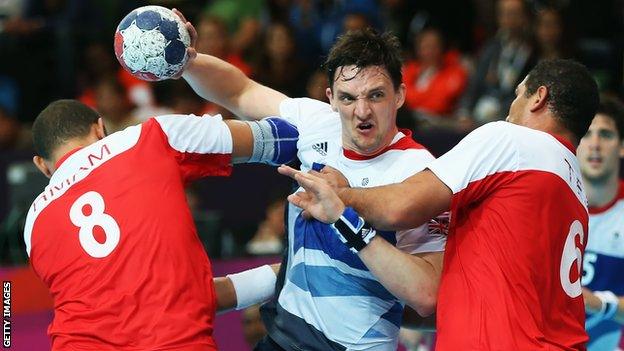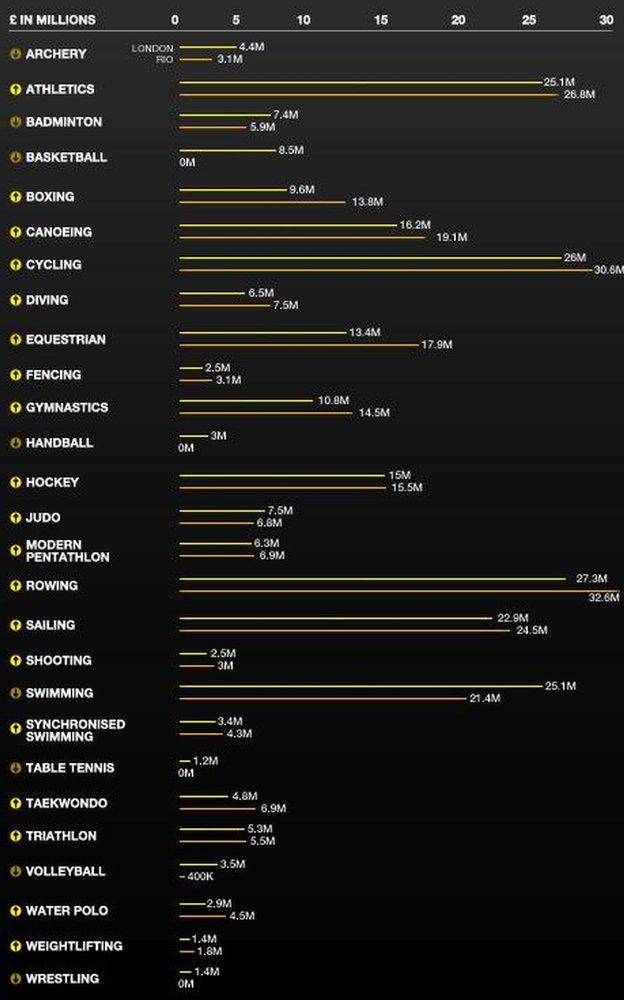Olympics funding: Handball player feels 'misled and cheated'
- Published

A British handball player says he feels "misled and cheated" after UK Sport removed the team's Olympic funding.
Chris McDermott spoke out after the sport - along with basketball, table tennis and wrestling - lost all central support for elite athletes in the build-up to Rio 2016.
GB Basketball called the decision to cut its funding a "waste" of previous investment.
But Minister for Sport Hugh Robertson backed UK Sport's approach.
The British men's and women's handball teams had their £2.92m funding to support elite athletes cut completely after finishing last in their groups at London 2012.
However on Monday the sport had its grassroots funding doubled from £0.6m to £1.2m. Officials say sports which lost their elite funding should concentrate on developing the next generation of Olympic hopefuls.
UK Sport says it will not pay for sports that do not have a genuine chance of qualifying for Rio.
McDermott told BBC Radio 5 live: "It feels we've been misled and cheated.
"I think the whole tag and mantra of the Games was 'legacy', and handball has shown we're capable of producing a legacy. In England, participation in the sport has quadrupled since the Olympic Games. If you take away the elite end, what do these kids have to aspire towards?
"The level of the sport will never improve unless the elite end is funded. I'm 100% dedicated. I'm going to continue to play the sport and I'm going to continue trying to improve not only my own level but the level of the sport in the UK, but they're just making it so much harder for us."
In response to the cuts, handball head coach Bill Baillie has started a petition, external lobbying for a change to the way British team sports are funded.
British Basketball's performance chairman Roger Moreland called the decision to remove the sport's Olympic funding "devastating".
"Having been funded to the tune of £8.5m in the lead-up to the London Olympics because of the sport's medal potential for the future, this is a devastating decision and is a waste of that investment," he said.
"It doesn't seem much of a legacy from 2012 to dash the hopes and aspirations of a sport whose heartland is founded in Britain's inner-cities."
But Robertson supported UK Sport's "no compromise" approach to distributing public money.
"Basketball teams are expensive," Robertson said. "If they have no chance of qualifying for Rio, would you want to fund them and then take the money away from a cyclist or rower who has a good chance of getting a medal?
"The funding for Rio is done on a performance basis. You have to make hard choices."
Britain's volleyball teams managed only one win - their minimum target - in London but their funding has been cut by 88.7% to £400,000, with only women's beach volleyball benefiting.
Speaking to BBC Radio 5 live, head of GB Volleyball Richard Callicott said: "It's been a devastating cut and we're still in shock, frankly. It's not a question that we failed - we delivered what we said we would do.
"We're part way through a programme and with no funding we can't complete that programme. So the legacy is zero. I call for a major review of the funding of team sports."
British Swimming lost £4m in funding after underperforming at London 2012, and accepts it must "rebuild confidence".
Set a target of five to seven medals in London, the team managed just three.
"While I'm obviously disappointed [by the cut], I have to be realistic. We failed in London," British Swimming chief David Sparkes said.
Sparkes, who saw swimming's budget shrink to £21.4m, added: "We thought we could achieve more [in London] but the bottom line is we underperformed. We now need to focus our energies on driving the cultural change needed moving forward.
"We recognise we need to rebuild confidence that we can deliver medals at Olympic level consistently before we can demand more investment."
Despite a cut in funding from £7.4m to £5.9m, Badminton England said it was pleased with its allocation. Britain's badminton players all failed to get past the group stages in London.
Badminton England chief executive Adrian Christy said: "I think the outcomes for Badminton England and the GB programme have been very good.
"We are satisfied with the investment, which is somewhere where we anticipated it to be. It gives us the opportunity to build on what we have been building and to continue to achieve what we set out to achieve."
Boxing, water polo, taekwondo and gymnastics have seen significant increases in money.
Olympic super-heavyweight boxing champion Anthony Joshua told BBC Radio 5 live: "I was on the Olympic team for 17 months before London, and the improvements I made and the championships I was going to and the experience I was getting, all through the help of the funding, brought me on leaps and bounds and helped me progress to win my gold medal."

- Published19 December 2012
- Published18 December 2012
- Published18 December 2012
- Published18 December 2012
- Published19 December 2012
- Published17 December 2012
- Published13 August 2012
- Published12 August 2012
- Published5 August 2012
- Published5 August 2012